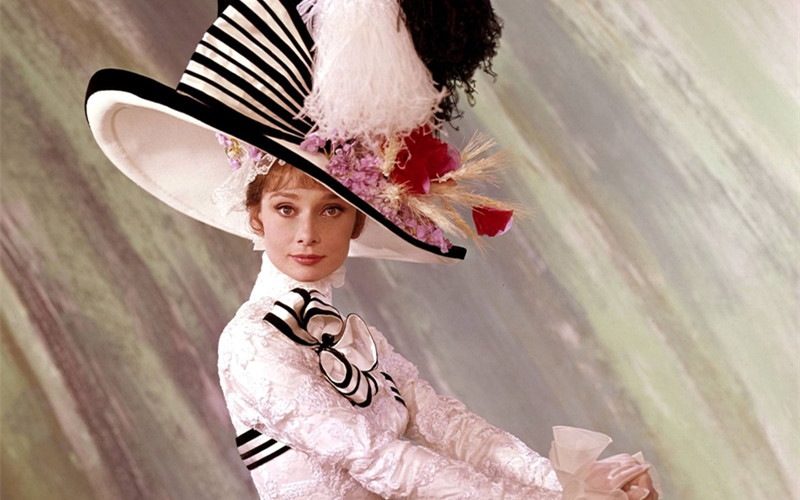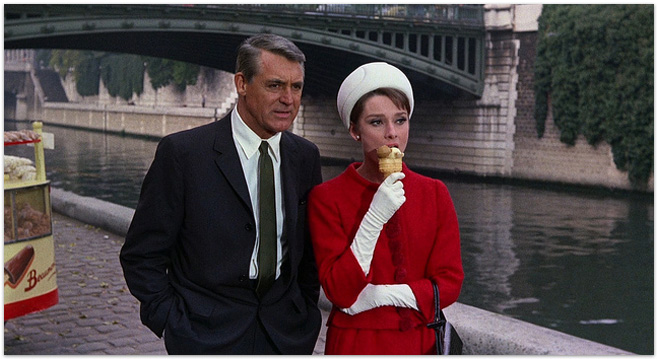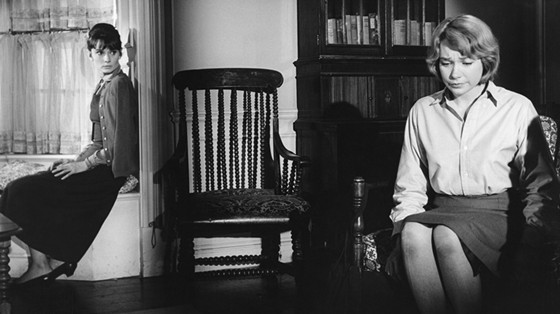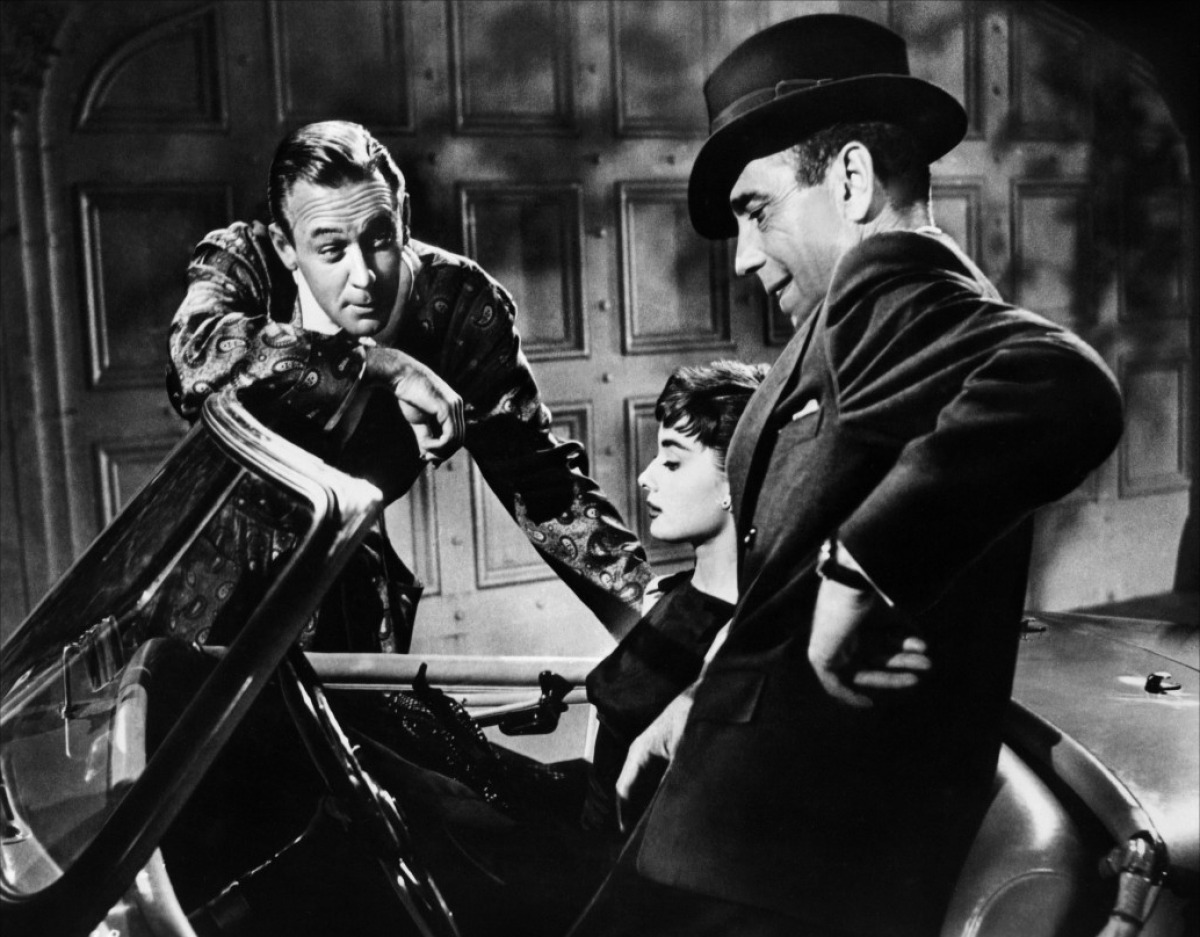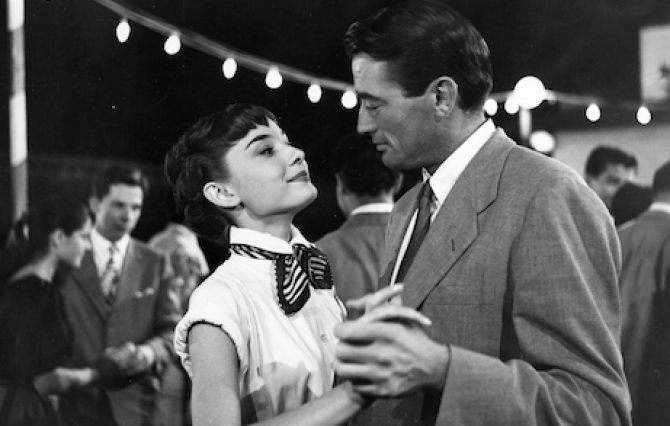5. My Fair Lady (George Cukor 1964)
Another of Audrey Hepburn’s most iconic roles was that of Eliza Doolittle in George Cukor’s classic musical, My Fair Lady, an adaptation of the long running and highly popular Broadway show. Based on the original 1913 stage play Pygmalion by George Bernard Shaw, which was first adapted into a film in 1938 and later turned into the Broadway musical this Hepburn film version was in turn based on.
The movie tells the story of Eliza Doolittle (Hepburn), a poor Cockney flower girl in 1912’s London, who, on a rainy night at Covent Garden, comes across the snobbish and arrogant phonetics professor, Henry Higgins (Rex Harrison). Higgins claims that use of language determines one’s fate in society and brags to his friend Colonel Pickering (Wilfred Hyde-White) that he could turn the flower girl into a lady of class by teaching her proper English for six months.
The next morning Eliza appears on the professor’s doorstep to take elocution lessons and Higgins accepts the challenge. Slowly but surely Eliza manages to change the way she speaks, but in doing so there are many unexpected consequences for the young flower girl and all those around her.
Still one of the all-time great movie musicals, My Fair Lady is a sumptuous looking film by Warner Brothers with very high production values and an array of classic musical numbers. Stunning set design, marvellous costumes and a great cast, with Rex Harrison and Stanley Holloway reprising their stage roles, make this an all-time winner. Audrey Hepburn is perfectly cast as Eliza Doolittle although she did not sing her own songs and was dubbed by Marni Nixon.
The film won eight Academy Awards that year, including Best Film, Director, Actor, Cinematography and Musical Score. Ironically, the Oscar for Best Actress went to Julie Andrews that year, who played Eliza Doolittle on stage but was replaced by Hepburn for the film version as Jack Warner thought the film needed more star power.
4. Charade (Stanley Donen 1963)
The second collaboration of director Stanley Donen and Audrey Hepburn (after Funny Face which isn’t included in this list), Charade is maybe easiest described as the best Alfred Hirchcock film ever made, not actually made by Alfred Hitchcock. And just like Hitchcock’s North By Northwest, the leading man here is Cary Grant.
Reggie Lampert (Hepburn) has decided to divorce her husband, but upon her return to Paris from holidays she finds out that he has in fact been killed. She meets Peter Joshua (Grant), seemingly a stranger, who offers to help her out when it becomes apparent that her late husband and four accomplices stole $250,000 dollars meant for the French Resistance during the war.
Her husband took off with the loot and three of the men (the fourth one having been killed in the war) are now after her and the money they feel they are still entitled to. The problem is that Reggie never knew about the crime and doesn’t know what happened to the money. And matters complicate further when the three accomplices start turning up dead themselves and her new found friend turns out to not be the person he had claimed to be.
Charade is part comedy, part mystery and part romance. Benefiting from a great screenplay, the chemistry between its two leads, who are also nicely supported by a cast which includes Walter Matthau, James Coburn, George Kennedy and Jacques Marin, an award winning soundtrack by Henry Mancini and nice location shooting in Paris, Charade is a classic thriller with clear screwball comedy influences. Hepburn also won a BAFTA award for her performance here.
3. Children’s Hour (William Wyler 1961)
Based on the play of the same name by Lillian Hellman and a remake of the film These Three, which was also directed by William Wyler 25 years earlier, The Children’s Hour is a painful drama about an at the time taboo subject, starring Audrey Hepburn, Shirley MacLaine, and James Garner.
Martha Dobie (MacLaine) and Karen Wright (Hepburn) have been best friends since college and together they run a private school for girls. One of their pupils, Mary (Karen Balkin), is a despicable little brat, who is constantly reprimanded for her bad behaviour. Out of of spite the girl tells her wealthy grandmother Amelia Tilford (Fay Bainter) that the two teachers are lesbians.
Shocked, the grandmother spreads the rumour and soon after every single girl is withdrawn from the school by their parents. Martha, Karen and her fiancée Joe Cardin (James Garner) try to fight the accusations to protect their livelihood and reputation but when the truth finally comes out, it might in fact already be too late.
Set in a time when the word “lesbian” could not even be uttered on screen (it is referred to as an “unnatural relationship” in the movie), director William Wyler nonethless decided to shoot the same story for a second time in his career. His first version, 1936’s These Three, could not even allude to a relationship between the two women and the lesbian angle was altered to a romantic triangle with a man instead. All performances are top notch here and special mention should also go out to Miriam Hopkins who plays Martha’s utterly self-centred live-in aunt. An underseen film by one of Hollywood’s great directors and one of Hepburn’s lesser known titles, The Children’s Hour ranks amongst her best work and is well worth seeking out.
2. Sabrina (Billy Wilder 1954)
Adapted for the screen from Samuel A. Taylor’s play Sabrina Fair, Sabrina is a classic romantic comedy directed by Billy Wilder and starring Audrey Hepburn, Humphrey Bogart and William Holden.
Sabrina (Audrey Hepburn) is the daughter of a chauffeur and lives together with her dad on the estate of the wealthy Larrabee family. The Larrabee patriarch has two sons: one, Linus, a serious workaholic business man (Humphrey Bogart), the other, David, a younger debonair playboy (William Holden). Sabrina only has eyes for David but he doesn’t take her seriously.
That is until she returns as a sophisticated lady from schooling in Paris but by that time David is already engaged to the daughter from a very wealthy family. Sabrina still wants to get her hands on him and he seems quite responsive but Linus steps in as the marriage is of the utmost importance to the Larrabee’s family business. In order to do so he tries to charm Sabrina himself and in the process actually falls in love with her, although he is initially unwilling to admit this.
Lighter and not as cutting edge as some of Wilder’s other comedies, Sabrina is nonetheless a lovely romantic comedy which is miles ahead of most other films in the genre. The outstanding cast contribute to this fact greatly and all three leads seem to be enjoying themselves in their respective parts.
The movie was nominated for five Academy Awards, including one for Best Actress for Hepburn, but ultimately only won one (Costume Design). The film was also remade in 1995 with Harrison Ford, Julia Ormond, and Greg Kinnear but didn’t even come close to capturing the charm of the original. This 1954 version on the other hand is as charming as it ever was.
1. Roman Holiday (William Wyler 1953)
The film that turned Audrey Hepburn into an immediate star with her first starring role in a Hollywood film, Roman Holiday is a classic romantic comedy directed by William Wyler and one of the earlier Hollywood films to be actually shot on location in a foreign country.
Princess Ann (Hepburn) is on a tour of various European cities but gets fed up with the tightly regimented schedule and decides to incognito explore Rome on her own. She escapes the embassy and falls asleep on a public bench as she was given some sedatives earlier by her doctor. It’s there that American reporter Joe Bradley (Gregory Peck) finds her and ends up taking her home as the drowsy Ann refuses to take a taxi home.
The following day Joe finds out who Ann really is and offers his boss an exclusive interview with the princess. Hiding the fact that he is a reporter, he takes Ann around Rome, showing her the sights, whilst he asks his photographer buddy (Eddie Albert) to shoot candid pictures of their adventures. Naturally, Joe and Ann end up knowing the truth about each other and falling in love but realise that their relationship could never actually be.
Roman Holiday is a remarkable film film for a variety of reasons. First of all there is the star-making performance by Hepburn, who ended up getting the part,which was originally written for Elizabeth Taylor. With her first feature film she managed to win an Academy Award, a Golden Globe and a BAFTA for Best Actress, the first actress to ever do so. Secondly the film was shot in the Cinecittà studios and on location in and around Rome, the latter being quite unusual for a movie of its time.
Rome is heavily featured in the film and as much as this is a love story between the two leads, the film is also a love letter to the city itself. Also noteworthy is the fact that the film’s screenplay was co-written by Dalton Trumbo whilst he was blacklisted in Hollywood. He therefore did not receive any credit at the time and his name was replaced with Ian McLellan Hunter, who fronted for him. In 2011 Dalton’s credit was finally fully restored.
A timeless romance and comedy, with two of Hollywood’s greatest stars both in top form and directed by one of Hollywood’s great directors, Roman Holiday is a true classic and the first as well as the ultimate Audrey Hepburn flick.
Author Bio: Emilio has been a movie buff for as long as he can remember and holds a Masters Degree in Cinema Studies from the University of Amsterdam. Critical and eclectic in taste, he has been described to “love film but hate all movies”. For daily suggestions on what to watch, check out his Just Good Movies Facebook page: https://www.facebook.com/goodmoviesuggestions.
